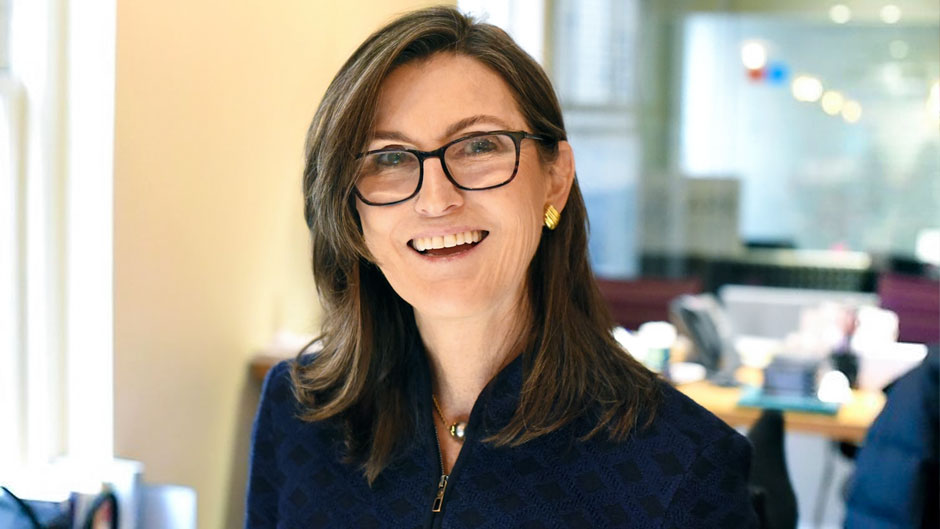Cathie Wood, an investment executive with four decades of experience, held a virtual conversation Wednesday with John Quelch, dean of the University of Miami Patti and Allan Herbert Business School, and explained that she launched her firm to spur emerging new technologies that might change the way the world works and lead to a more sustainable future.
“Volatility is not a bad word,” Wood said during the latest Distinguished Leader Series. “Our strategy is inherently volatile, and disruptive innovation is controversial—these companies are going to disrupt the old-world order, which is the foundation for most traditional asset managers and processes.
Arthur Laffer, a renowned economist and presidential advisor, introduced Wood and spoke about the former student who petitioned to take his class as an undergraduate. “Little did I know the greatness that was coming into my classroom,” said Laffer, best known for the Laffer curve, a concept for an ideal government tax rate. “As it’s turned out, she’s been just phenomenal.”
A top money manager with several firms for a three-decade span, Wood explained what motivated her to start her own firm in the aftermath of the 2008-09 economic meltdown.
“A lot of financial managers had let their clients down, and investors wanted more transparency,” she recalled. That scenario prompted many clients to move toward more passive strategies—buying a security to hold it long term—yet Wood sensed instead that providing more transparency and adopting an active approach, or risking short-term price fluctuations or market timing, was essential.
ARK Invest [Active Research Knowledge] was founded for two reasons: to focus exclusively on disruptive innovation and to create an open-source research eco-system, she explained.
Wood said that she founded the company with an aim to learn what was going on in university systems—for her the leading edge of research—and continues to attract and hire many individuals from college who “have one foot in the new world,” she noted.
“Innovation is all about the future,” she said. “I felt the world needed what we had to offer, both the kind of wrapper [the service orientation] and the focus on disruptive innovation, which is geared towards disintermediation [cutting out the middle players in a supply chain] and changing the traditional world order in a big way.”
According to Wood, the seeds for the massive innovation emerging from new technologies today were all planted in the past 20 years, which ended in the tech and telecom bubble.
“They have been gestating for these last 20 years and now they’re ready for prime time,” she said. “Isn’t it interesting that investors are scared to death, yet unlike in the late 1990s when it wasn’t real [the technologies were still immature and cost prohibitive], it’s real today.”
The CEO compared the scenario and possibilities for innovation today with the early 1900s and the three major discoveries—telephone, electricity, and automobile—that were then transforming the world.
ARK Invest, Wood explained, is structured across five major disruptive platforms—DNA sequencing, geared to transform health care; adaptive robotics, which can work alongside human beings and offset labor shortages; energy storage and the movement to electric transportation; artificial intelligence, which Wood describes as “the glue holding everything together;” and blockchain technology. Fourteen separate technologies are influencing these five platforms.
Does she believe, as some have suggested, that China has overtaken the U.S. as the leader in global technology?
“The world is going open-source in terms of software and technology, and China is cutting itself off from a good bit of that,” she said. This is an indication that they think they can do it themselves and import talent, she added.
In the crypto world, miners are prohibited and it’s unlawful to traffic in bitcoin in China, she continued. “That is shutting down an open-source movement which is a new digital, rules-based system—the rest of the world is going to move towards that, and there is power in numbers here,” Wood noted. “They seem to be cutting themselves off from the rest of the world, and isolationism typically doesn’t work.”
Wood suggested that innovation, which spurred by emerging new technologies was already explosive, has become turbocharged in the pandemic. And disruptive innovation, a concept birthed in the mid-1990s meaning to stimulate new technologies, new markets, and values to supplant traditional ones that fail to serve the needs of the planet—are more prevalent and essential today than ever before.
For students looking to enter the investment field or to advance their own projects, Wood said, “incredible perseverance” is a key trait that is necessary.
“You have to have a real belief that what you’re doing is what the world really needs,” Wood pointed out. “And preferably provide it in a way that no one else is already doing.”

